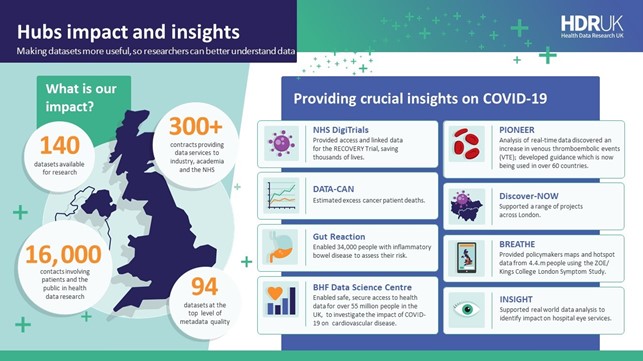Celebrating impact from our Health Data Research Hubs
31 August 2023
Since the Hubs were set up in 2019 as part of the Digital Innovation Hubs Programme, they have developed a long way. Here, we look back to see how they’ve evolved and how they’re enabling impactful research in a safe and secure way.

May 2019, competition opens for Digital Innovation Hubs
Health Data Research UK, in partnership with the UK government, launch a £22million competition to create centres of excellence to pioneer the use of health data for research and innovation. Part of the Digital Innovation Hub Programme.
October 2019, seven new research Digital Innovation Hubs announced
Following a competitive process, an independent panel select seven new research Hubs for funding, addressing distinct areas of disease, geography, or types of data. Over 100 organisations across the UK are involved in the Hubs, from the NHS and universities to charities and technology and pharmaceutical companies.
March 2020, Hubs are open for business and making data available
The Hubs underwent a 3-month milestone review to demonstrate they were set up for success. All Hubs passed and demonstrated:
- They could make new data discoverable – collectively, the Hubs added 47 datasets to the HDR Innovation Gateway, with metadata available for a range of dataset types, meaning researchers could easily find and access new data for research that wasn’t previously available
- They worked with the public and patients – Hubs had patients and members of the public involved in decision-making at all levels, from making sure data is used to give the most benefit to patients, to creating specific materials to help the Hubs explain to the public how their data is used. Several hubs also have multiple patient or lay representatives on their boards
- They were set up to deliver research – 39 projects were already underway across the network of Hubs, working to develop an app to manage breast cancer, use high street eye imaging data to help diagnose dementia, and more.
February 2021, Hubs create a set of common agreements
The funding of a cadre of Hubs at the same time provides the opportunity to adopt common working practices. For example, using the HDR Innovation Gateway to make data discoverable to other researchers and working with the UK Health Data Research Alliance to adopt common standards.
The Hubs collaborated to create a common Master Services Agreement for use in contracting and standardising approaches to commercial terms. Whilst the Hubs use variations on this agreement in their day-to-day business, this common approach aligned overarching principles of working with commercial partners. By June 2022, the Hubs had signed contracts for 175 projects with industry.
March 2021, many Hubs pivot to support the national effort against COVID-19
As the scale of the COVID-19 pandemic was realised, the Hubs started to support the national effort to understand the direct and wider health implications of the pandemic. Some of their efforts included:
- DATA-CAN collected and analysed ‘real-time’ data from UK cancer centres, covering over 3.5 million people. This data provided a valuable insight into the effects of the COVID-19 pandemic on cancer patients and services and contributed to the decision to restore cancer services.
- BREATHE supported the rapid set-up of the EAVE II study, which linked patient data across the entire Scottish population, providing the first real-world evidence of the success of the vaccination programme.
- DigiTrials supported the creation of data pipelines to support the efficient delivery of the RECOVERY trial. RECOVERY was the world’s largest COVID-19 clinical trial that tested ten drugs and found four effective medications to date.
April 2021, further milestone shows continued impact of the Hubs
Eighteen months into the life of the Hubs, their activity was reviewed by an independent panel. The Milestone review showed the Hubs had delivered:
- over 300 research projects
- over 20,000 interactions with public or patients to inform or engage them in the Hubs work.
- 157 datasets available for research via the Innovation Gateway
- over 2,300 training activities
May 2021, new Hubs focused on pain and mental health are announced
Two new Hubs were announced to bring the total up to nine.
With funding from the Medical Research Council (MRC) and Versus Arthritis, Alleviate – the Advanced Pain Discovery Platform (APDP) Hub, is announced by the University of Dundee.
Simultaneously, with funding from the MRC, DATAMIND, the Hub for mental health, is announced by Swansea University and King’s College London.
July 2021, Hubs recognise the importance of public and patient involvement for National Coproduction Week
During National Coproduction Week, the Hubs celebrated the central role and impact that the public and patients have within each of the Hubs.
Samantha, a Patient Advisory Committee member at Gut Reaction, shared her thoughts:
“It helps me to put my viewpoint across about health data, who accesses it and how and why it is accessed. It enables me to help co-design information that is focused on people living with Crohn’s and Colitis.
“I believe we are a vital part of the process and the solution and must be included and invited to get involved, at every level.”
Learn how PIONEER and INSIGHT embed patients into decisions about data use. Read how patients and the public are central to the work of Discover-NOW, DATACAN and the perspective of a public member involved in GUT-REACTION.
August 2021, launch of the Hub playbook to support development Hubs
An aim of the Hubs was to demonstrate the best ways of enabling data sharing at scale in a safe and secure way. The Hub Playbook was developed to capture and disseminate the Hub model so others could learn from it.
December 2021, Hubs innovate in how data is made available for research
One role of the Hubs is to test and develop their data services, building on the cutting edge of data science. PIONEER, the Health Data Research Hub for Acute Care, started making its data available in synthetic format – artificially generated data which is used to replicate the original components of real-world health data. This can be useful to make health data more accessible for analysis and technology development whilst protecting the it protecting the privacy of individual records in particular datasets.
PIONEER and BREATHE, the Health Data Research Hub for Respiratory Health collaborated to produce a guide on working with synthetic data.
December 2021, HDR UK publish a blueprint for a Hub to support longitudinal population research
Commissioned by MRC, the Economic and Social Research Council (ESRC) and Wellcome, HDR UK published a proposal for a Hub to support greater use and impact of the UK’s rich set of longitudinal studies and cohorts. The initiative was called Population Research UK and it received £9m from UKRI in 2021 for a single programme of work to run until 2028.
February 2022, Hubs reach 500 project milestone
The Hub network reached a landmark of enabling 500 research projects, working with partners from across academia, industry and the NHS. Each Hub maintains a project summary log on its website, and you can read more about the projects here. Some exemplar projects include:
- Discover-NOW worked in partnership with AstraZeneca, to co-deliver a project to see how real-world evidence can improve the clinical pathways for management of Type 2 diabetes. Using real world data, the project has identified a baseline for practice, informed the design of new pathways, and enabled monitoring of the difference this has made to patient care and outcomes.
- INSIGHT collaborated in using hospital eye scans curated by the Hub for deep-learning approaches to detect geographic atrophy, a major vision-threatening manifestation of age-related macular degeneration.
- PIONEER have used their detailed hospital data to understand paracetamol prescription errors in their hospitals. A digital clinical support tool was developed that could eliminate errors and increase the timeliness of prescriptions in line with best practice.
March 2022, DigiTrials, the Health Data Hub for clinical trials achieves major sustainability target
The DigiTrials Hub was pump-primed with 18-months of initial funding from the Digital Innovation Hub Programme. After showing success, particularly through enabling COVID-19 clinical research, DigiTrials was awarded major follow-on funding as part of the UKs Life Sciences Vision to harness NHS data to drive health research and innovation.
You can read the UK government funding announcement here. The funding will be used over three years to support the expansion of NHS DigiTrials ‘Find, Recruit, and Follow-up’ service that seeks to improve efficiency of clinical trial delivery.
June 2022, a showcase event for the DIH Programme
This one-day event showcased the latest developments in technology, infrastructure and standards supporting the trustworthy use of health data for research. The event connected colleagues from across the community, from healthcare, academia, charities, industry and representatives from public and patient groups, and showcased the programme’s impact to date, including updates from the 9 Hubs, the Alliance and the Gateway.
2023 and beyond
From 2019-2023, the Hubs were supported by UK Research and Innovation’s (UKRI) Industrial Strategy Challenge Fund (through the Data to early diagnosis and precision medicine challenge) as part of HDR UK’s Digital Innovation Hub (DIH) Programme. Although this funding has now ended, the Hubs continue to move forward with their unique expertise and datasets to enable approved data users to make discoveries that improve people’s lives.



